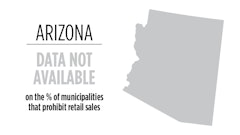
Zoning parameters for cannabis dispensaries, such as restrictions on operating near schools, churches and residential neighborhoods, often create an added hurdle for aspiring entrepreneurs in the space.
For those who plan on opening a retail facility in Tucson, Ariz., following the state’s April 8 lottery to issue 26 social equity retail licenses, special zoning rules for the winners could take six months.
But elected officials in the state’s second largest city said establishing exceptions for real estate locations is part of a plan to help ensure those who are supposed to benefit from Arizona’s social equity provisions in the state’s adult-use cannabis program are the ones who actually benefit, the Arizona Daily Star reported.
Tuscon Mayor Regina Romero and city council members voted unanimously last week to direct zoning department officials to begin drafting a special exception process that would impose certain conditions on adult-use facilities in the city limits, according to the news outlet.
While the Arizona Department of Health Services’ (ADHS) intent in issuing 26 social equity licenses is to uphold provisions in the state’s voter-approved Proposition 207 from the November 2020 election, Romero wrote in a memo that several people who were disproportionately impacted by prohibition were excluded entirely from applying for one of the licenses because a $4,000 application fee imposed by ADHS caused a barrier to entry for low-income residents.
ADHS officials said the department received more than 1,500 applications for the social equity licenses. Leaving leeway in the regulatory groundwork, Prop. 207 established that the 26 licenses be awarded to applicants impacted by prohibition.
The state’s rules governing those social equity licenses lack protective provisions, such as a ban on license transfers (preventing larger companies or multistate operators that wouldn’t otherwise have qualified for the licenses from acquiring the licenses), as well as a requirement that licensees’ expenditures and profits remain in their communities.
A lawsuit, filed in part by the Greater Phoenix Urban League, challenged those omissions in the rules, but a judge dismissed the lawsuit earlier this year.
RELATED: Lawsuit Challenging Arizona’s Social Equity Licenses Dismissed
Now, Tuscon elected officials are eyeing zoning regulations as a means to strengthen participation for social equity license winners and help the underserved communities the licenses were intended for, Romero said during last week’s council meeting.
“AZDHS didn’t really take into account the concerns that mayor and council had in terms of social equity licenses,” she said. “The process that AZDHS put together really allowed for corporate dispensaries to really take advantage of the AZDHS process. And so, I just want to make sure that we initiate the process and have a fair process in front of us.”
But the zoning process to enact special exceptions for social equity license holders could take roughly six months, Tuscon city attorney Mike Rankin told the Daily Star.
The established terms for where a social equity retail facility can operate then must be approved by the majority and council members.
Rankin told the news outlet that city staff will consider zoning conditions that encourage dispensaries to “bring business and commerce to those areas that were supposed to benefit from this structure, this idea of social equity in the first place.”
























